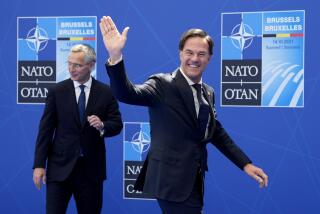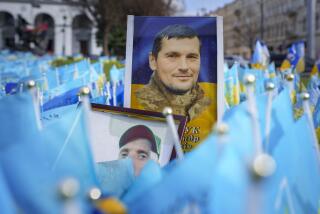Dutch Drop Draft, Seek Tougher Military
- Share via
AMSTERDAM, Netherlands — Recruits are getting haircuts, and drug use is no longer tolerated. Spit and polish is back in vogue in the Dutch military.
With the Cold War over and military personnel needs down across Europe, the Netherlands has phased out its 84-year-old draft and gone over to an all-volunteer force with more discipline.
Dutch armed services have been cut 37% from 101,000 to 63,800 service members, and military strategy has been refocused on providing units for global peacekeeping missions.
Permissive attitudes instituted in the 1960s are changing. Regulations guaranteeing liberal and humane treatment of troops are being amended to ensure a leaner and tougher military. A new code of conduct being drawn up will specify stricter standards for the more professional force envisioned.
New regulations already ban troop use of marijuana and hashish--even though the drugs are tolerated in Dutch civilian life. Since August, first-time military offenders get a warning, and dismissal follows a second offense.
Current rules still allow ponytails and earrings for many recruits serving in the Netherlands, but grooming rules are being tightened. Soldiers, airmen and sailors serving with United Nations or NATO forces abroad must keep their hair short to conform with international standards.
The air force has already gotten a head start on the army and navy in image reshaping. All air force personnel with long hair had to get trims by Sept. 1.
Adriaan Meijer cut off his blond ponytail recently when he joined the air force as a fighter pilot trainee.
“I was strongly advised to get it cut because where I was at, it wasn’t considered acceptable,” he said. “It’s like working for a company now; you choose to take the job and these are the rules and you have to follow them.”
Meijer said that during his conscript days eight years ago, “people were high on hashish most of the time or they just sat around and drank coffee.”
Life these days on the air force base is quite different.
“I got a culture shock in the beginning. All of a sudden all your freedom was taken away from you,” he said.
But the all-volunteer force is a boost to morale, he added.
“It’s comforting to know that the people I work with and depend on want to be there. I expect them to be more motivated.”
Starting in the 1960s, the military began to reflect liberal attitudes of Dutch society.
Soldiers got an eight-hour workday, unions and the right to be openly gay.
Ponytails and earrings were permitted, along with off-duty use of some drugs, such as marijuana and hashish. The obligation to salute was abolished in the 1970s.
Among NATO allies, the Dutch were famous for their relaxed attitude, although experts said that didn’t necessarily mean they were bad soldiers.
“The Dutch were a bit hard to take with their extremely democratic spirit in the military. It was difficult to grasp,” said Edward Foster of the Royal United Services Institute, a military studies center in London.
A Defense Ministry spokesman, Otte Beeksma, said the goal of the new code of conduct due out soon will be to reflect a “set of common values.”
“It’s part of our ongoing debate, and the policy will be a bit tighter concerning ponytails and earrings,” Beeksma said.
Homosexuals will continue to be welcome in the armed services, and the non-saluting policy won’t change.
The nation’s largest association for professional military personnel cautiously welcomes the new code.
“We are not against this process of tightening the reins, but we don’t want to see unnecessary or obsolete regulations. We don’t want any new rules that will turn the military into an island of its own,” said Bauke Snoep, president of the Dutch Federation for Military Personnel.
More to Read
Sign up for Essential California
The most important California stories and recommendations in your inbox every morning.
You may occasionally receive promotional content from the Los Angeles Times.










